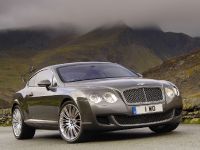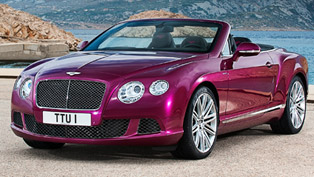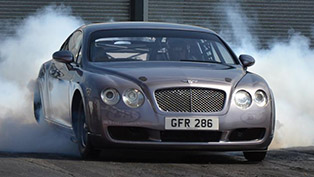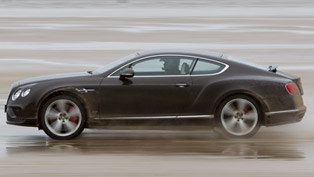Bentley Continental GT Speed
The Continental GT Speed is the most powerful production Bentley ever and the first to top 200mph (322km/h). A potent addition to the company's highly successful Continental series, the GT Speed extends the appeal of the Continental GT coupe to driving enthusiasts who place a high value on outright performance and agile handling.
The exterior style of the new Continental GT and GT Speed models is defined by a wider, lower air intake and more upright radiator grille that also provide increased airflow to the more powerful GT Speed. Its 600bhp (610PS) W12 engine develops 15 percent more torque and nine percent more power than the standard Continental GT, while engine efficiency is optimised by the use of lower friction, lighter-weight components and a new engine management system. The resultant performance is exceptional, with a top speed of 202mph (326km/h), a zero to 60mph sprint time of just 4.3 seconds (0-100km/h in 4.5s) and effortless overtaking capability.
Complementing the Continental GT Speed's high performance is its unique chassis tune that delivers tauter handling and improved agility, with new, wider 9.5J 20-inch wheels and bespoke performance tyres as standard fitment. Fade-resistant carbon ceramic brakes are available as an option. Subtle design touches, including a dark-tinted front grille and larger sports tailpipes, reinforce the sporting character of the Continental GT Speed.
Inspiration for the GT Speed came from the legendary ‘Speed' models that first appeared in 1923. The standard Bentley 3-litre had already established Bentley's engineering superiority in terms of roadholding, handling and braking, but W.O. Bentley, the company's founder, recognised the market potential for a more potent version aimed at the enthusiast driver who demanded superior performance. His response, the 3-litre ‘Speed Model', complete with twin SU carburettors and a higher compression ratio engine, became one of the most coveted of all Bentleys.
Both the GT Speed and the 552bhp (560PS) Continental GT benefit from internal efficiency improvements to deliver reduced fuel consumption and CO2 emissions. The Continental GT remains outstandingly quick – its top speed is unchanged at 198mph (318km/h), with a 0-60mph sprint time of 4.6 seconds (0-100km/h in 4.8s).
The all-wheel drive Continental GT changed the face of the luxury coupe market and attracted a wider audience to the Bentley marque. It also represented the first step in Bentley's renaissance, positioning the company at the pinnacle of both technology and consumer aspiration. Since its launch, demand for a sportier version of the Continental GT was met by the successful introduction of the 2005 GT Mulliner Driving Specification and the limited edition GT Diamond Series in 2006, to celebrate 60 years of Bentley at Crewe. Now, with the launch of the Continental GT Speed, customers will enjoy even greater choice. Bentley Chairman and Chief Executive Dr Franz Josef-Paefgen welcomes the expansion of the Continental GT model offering:
"The Continental GT is a highly successful, modern-day Bentley icon. The new GT Speed, with its harder-edged character and sportier driving experience, builds on this success."
Engine enhancements for all Continental GT models
At the heart of both Continental GT models is the Bentley 6-litre, twin turbocharged W12 engine, the most compact 12-cylinder engine in production. The 48-valve head employs four camshafts and continually variable valve-timing. Power is transmitted via a ZF six-speed automatic transmission.
For the Continental GT, the engine continues to produce 552bhp (560PS / 412kW) at 6100 rev/min and a maximum torque of 650Nm (479lb ft) from1600 rev/min. The twin, low-inertia turbochargers are a key factor in producing the flat torque curve, characteristic of every Bentley.
A new higher output of the W12 engine is specified for the GT Speed, sharing engine efficiency improvements with the GT model. New lighter weight con rods enhance engine response, while new pistons, with anodised compression ring grooves, are designed to withstand increased cylinder pressures. Together with a recalibrated version of the new engine management system, the GT Speed develops nine percent more power than the GT - 600bhp (610PS) at 6000 rev/min. The maximum torque of 750Nm (553lb ft) at 1750 rev/min represents an increase of over 15 percent versus the standard engine. As a result, the GT Speed becomes the first production Bentley to top 200mph (322km/h), with a V-max of 202mph (326km/h).
Both the Continental GT Speed and GT models now produce lower CO2 emissions of 396g/km, down from 410g/km, an improvement of 3.5 percent. Fuel consumption is improved by a similar amount.
Brian Gush, Director, Chassis and Powertrain, says the two new models offer something for every Bentley enthusiast:
"The Continental GT will continue to be the benchmark for the luxury coupe class, offering an unrivalled blend of performance and refinement. The new Continental GT Speed is a true driver's car with immense power and superb handling."
The advanced ZF 6HP26 six-speed automatic gearbox has the ability to lock up its torque converter during normal driving conditions replicating the immediacy of a manual transmission while maintaining the smoothness of an automatic. A manual override function allows clutchless manual changes via the gearlever or steering wheel paddles.
Providing huge levels of grip and stability in all weather conditions, the all-wheel drive system harnesses the prodigious power and torque of both the Continental GT and GT Speed coupes. The system uses a central Torsen differential and a differential on both the front and rear axles providing a standard 50:50 torque split. This front to rear ratio is variable depending on the available grip and the system can sense slip of less than one percent and react by apportioning the engine's torque to either the front or rear axle.
The advanced electronic stability programme (ESP) has been uprated to ESP 8.1 for both models. The Continental GT has a new "Sport Traction" mode that moderates ESP intervention at low speeds, providing a greater degree of driver interaction and control. This is particularly beneficial from standing starts, for example when pulling away uphill on low traction surfaces.
The Continental GT Speed offers a new 'Dynamic Mode' that allows increased wheel slip at higher speeds than the 'Sport Traction' mode on the standard chassis. Torque is reinstated more quickly after the traction control system is triggered, giving the spirited driver a greater sense of control and the ability to exploit the full potential of the new engine.
Chassis, suspension and steering modifications for both the Continental GT and GT Speed models ensure they have the handling to match their formidable powertrains. Both are suspended on double wishbones at the front and a trapezoidal multi-link system at the rear. Much of the suspension is made from lightweight aluminium. The GT Speed model also benefits from a solid-mounted front subframe, while high-stiffness aluminium front uprights are common to both models. Together with stiffer rear suspension bushes these deliver even sharper handling characteristics. The GT Speed also features modified front and rear anti-roll bars to minimise understeer and optimise handling balance.
Self-levelling air suspension that constantly monitors and adjusts the ride height and damping according to road conditions is common to both models, although the GT Speed is engineered to sit 10mm lower at the front and 15mm lower at the rear to improve handling dynamics. Uprated springs and dampers, together with revised software control, further improve the agility and body control of the GT Speed.
All-new 9.5Jx20-inch alloy wheels with bespoke Pirelli P-Zero tyres have a major effect on the GT Speed's steering and grip levels. The wider wheel and reduced tyre wall profile improve the tyre's lateral stiffness giving noticeably sharper steering response and feel. The new Pirelli performance tyres are developed specifically for the GT Speed and benefit from a unique construction and rubber compound for enhanced levels of grip.
Both the Continental GT and GT Speed benefit from changes to the rack and pinion steering. Revisions to the system's hydraulics reduce friction and improve steering feel, while a new version of the speed-sensitive Servotronic system also increases levels of feedback to the driver.
Secondary ride levels – the response of the car to poor road surfaces, pot holes or cats' eyes, for example – have been improved on the 552bhp Continental GT model with the addition of low friction dampers. And even though the new GT Speed has stiffer, lowered suspension its ride quality is on a par with the 2007 Continental GT.
The Continental GT and GT Speed are both equipped with the largest brakes of any production passenger car on sale today. The ventilated front discs have a 405mm diameter and are 36mm thick. Ventilated discs are also used at the back, with a diameter of 335mm and a thickness of 22mm.
For both models, the performance boundaries are further extended by Bentley's optional carbon/silicon carbide brake system. Boasting 420 x 40mm carbon-silicon carbide, cross-drilled front discs and 356 x 28mm rears, with eight-piston callipers, the new brakes are even larger than the standard system. The system provides a 20kg reduction in rotating and unsprung mass, benefiting steering response and handling.
The lightweight, fade-resistant braking system minimises disc distortion under high thermal conditions. Under normal driving conditions the brake discs will last the lifetime of the car. Furthermore, brake pad life is doubled compared with the standard braking system.
Complementing the braking systems of both Continental GT models are sophisticated safety systems, including Hydraulic Braking Assistance (HBA), anti-lock braking (ABS), drag torque control (MSR) and Electronic Brakeforce Distribution (EBD). The latter monitors the level of grip available to each tyre and apportions braking force accordingly. This not only helps reduce stopping distances but also greatly enhances the control enjoyed by the driver under heavy braking.
Subtle changes to acclaimed coupe design
The Continental GT has received many accolades for its distinctive, muscular and elegant style. It has redefined the concept of the contemporary Grand Touring coupe: forward looking yet faithful to Bentley's design heritage. Classic sculpted coupe design cues such as curvaceous rear haunches, short front overhang, prominent front grille and longer rear overhang echo the look and feel of some of the great Bentleys of yesteryear. The style of the GT has stimulated customer interest like no other Bentley to create a modern-day design icon. For the latest iteration of the Continental GT success story, the enhancements of the car's exterior are therefore intentionally subtle, as Director of Design, Dirk van Braeckel explains:
"Our objective was to convey the performance potential of the new GT Speed model, while retaining all the design cues so valued by our customers."
The principal changes to the frontal appearance are common to both the GT and the new GT Speed. The subtly revised front grille, now more vertical, has a more pronounced square edge accentuating the GT's distinctive Bentley profile. Beneath the grille, the all-new lower bumper design features a wider central air intake that emphasises the sporting stance of the new models. Chromed bezels around the headlamps complement the new frontal design.
The Continental GT Speed is distinguished from the Continental GT by its dark-tinted chrome matrix grille to the main and lower air intakes. Bright chromed grilles may be specified at no extra cost. At the rear, a black lower bumper valance and wider, rifled exhaust tailpipes emphasise the GT Speed's sporting character, reinforced by new multi-spoke 20-inch sports alloy wheels. As an option, these may be specified with a dark chromed finish.
The GT Speed's cabin is based on that of the Mulliner Driving Specification (a cost option on the standard GT). It includes a choice of veneers (Burr Walnut, Dark Stained Burr Walnut and Piano Black), Diamond-quilted hide seats with embroidered Bentley emblem, indented hide headlining, a sports alloy gearlever, three-spoke multi-function sports steering wheel, drilled alloy foot-pedals as well as ‘Speed' logos to the treadplates.
A range of Mulliner options provide further opportunities for personalisation including fascia panels, header and centre console in bright aluminium or, unique to the GT Speed, dark tint aluminium (compatible only with Dark Stained Burr Walnut veneer or Piano Black veneer and single tone interior colour scheme). The Continental GT also benefits from a new Bentley ‘B' brake pedal.
Continental GT and GT Speed customers have a choice of 16 ‘standard' paint colours and 17 premium grade leather hide colours, including two new exterior paint colours (Cumbrian Green and Granite) and two new interior leather hide colours (Newmarket Tan and Cumbrian Green). Customers also have the option to select from the Arnage colour palette or choose Bentley's colour-matching programme to produce a bespoke colour of their choice.







![Bentley Unveils the Updated Continental GT Speed Black Edition [642 hp & 840 Nm]](http://www.automobilesreview.com/uploads/2016/04/2016-Bentley-Continental-GT-Speed-Black-Edition-FF.jpg)





